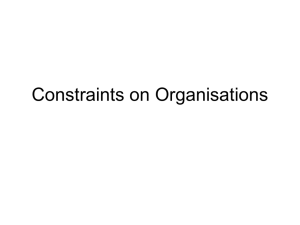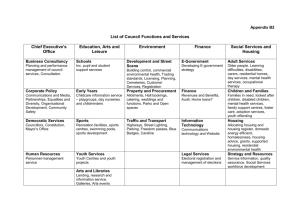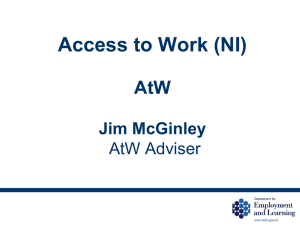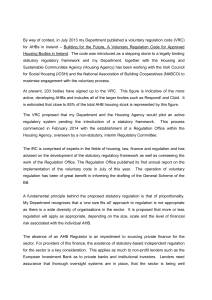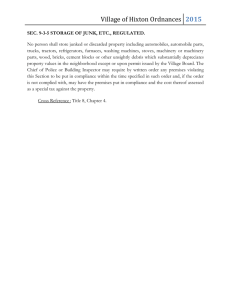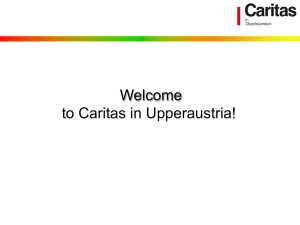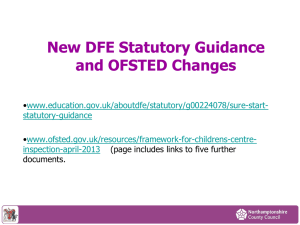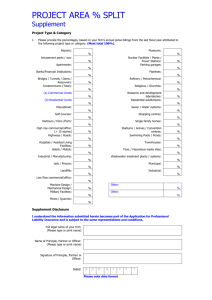Standards and Guidelines for the Provision of Generalist Voluntary
advertisement
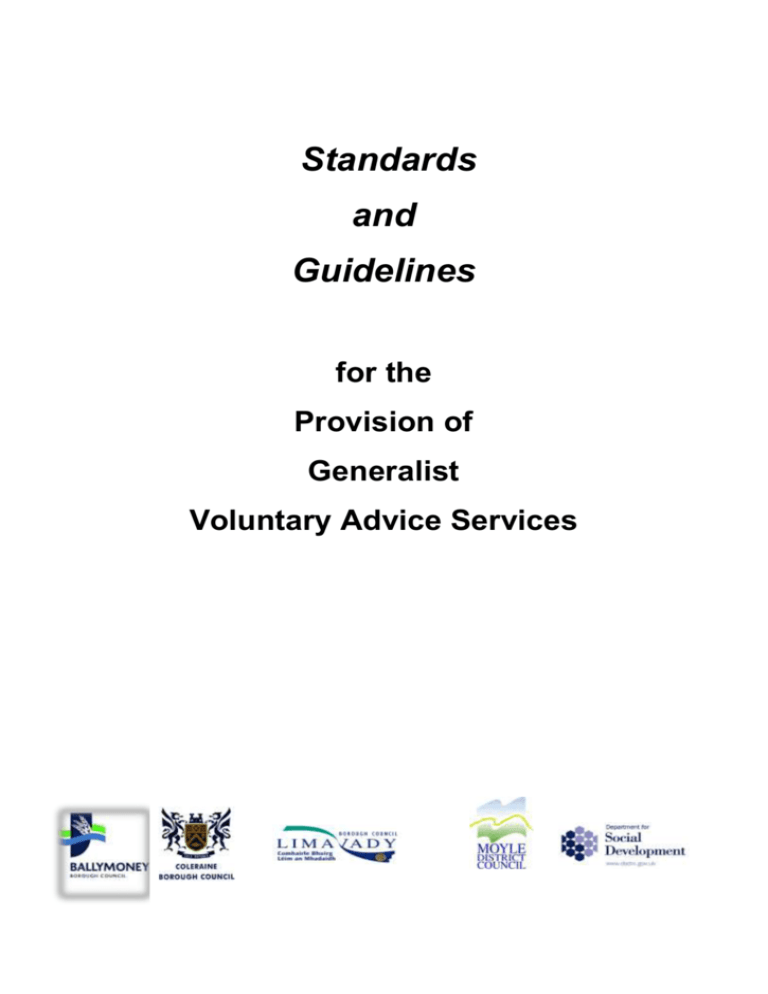
Standards and Guidelines for the Provision of Generalist Voluntary Advice Services CONTENTS 1. Background ......................................................................................................... 1 2. Advice Definition ................................................................................................. 3 3. General Principles ............................................................................................... 4 4. Management ....................................................................................................... 6 5. Staffing ................................................................................................................ 9 6. Training ............................................................................................................. 10 7. Premises ........................................................................................................... 11 8. Recording Systems ........................................................................................... 13 9. Advice Work ...................................................................................................... 14 10. Finances ......................................................................................................... 16 11. Auditing/Monitoring Advice ............................................................................. 17 2 1. BACKGROUND 1.1. In the early 1990s, the Advice Services Alliance established a set of Standards and Guidelines for organisations providing advice services. The Advice Service Alliance (A.S.A.) is made up of the three main organisations providing support to independent advice providers: Citizens Advice (formerly N.I.A.C.A.B.) Advice N.I. (formerly A.I.A.C.) The Law Centre N.I. 1.2. Recent work by the A.S.A. has lead to the production of new draft standards on Training, I.T. and Quality Standards. It is intended that these will eventually apply to all advice providers in N. Ireland and that adherence to these will be a precondition for funding. In terms of I.T., the standards work towards a shared standard I.T. system which ensures that policy codes are consistently used and that the system can provide the information needed by Government. Training will be taken forward within the National Qualifications Framework which should facilitate greater consistency of advice work. The Quality Assurance guidelines sets out a basis for quality of provision, within BS7799/ISO27001 and introduces a process of external accreditation and organisational audit. 1.3. A range of relevant policy at central government level provides the context for the provision of voluntary advice services. The Department for Social Development (DSD) carries overall responsibility for central government policy and funding of generalist voluntary advice. In this role it commissioned a strategy for the Northern Ireland Advice Sector in 2004 leading to the Opening Doors document which currently provides the policy for such work. Subsequently the Department commissioned work on the location of voluntary advice services aiming to consolidate the idea of Area Advice Centres ensuring maximum use of resources yet best possible public access. 1.4. In 2011 the Department published Guidance on the Provision of Local Generalist Voluntary Advice. Along with the Opening Door strategy this provides a basis for determining what local advice work should look like. 1 1.5. The Standards and Guidelines set out in this document will be used by Ballymoney Borough Council, Coleraine Borough Council, Limavady Borough Council and Moyle District Council as a tool upon which to base funding decisions and to ensure that good quality services are provided. On an ongoing basis these will be updated to ensure alignment with new standards and best practice as they arise. 2 2. ADVICE DEFINITION 2.1. DSD guidance suggests that the definition of generalist advice used by the councils is: A provider which offers advice as a primary role and major part of its overall provision, not as a by-product of its other work; An advice provider which employs at least one paid appropriately trained advice worker; A provider which offers advice in the following areas: o welfare/benefits advice o employment issues o housing o health and disability o basic consumer advice o basic money and debt advice 2.2. Providers may also provide more complex money and debt counselling, consumer advice, tribunal representation, basic immigration advice, etc., depending on their expertise; 2.3. Providers must be members of Citizens Advice or Advice N.I. or equivalent organisation; 2.4. Providers must have appropriate insurance to cover liability to clients; 2.5. Providers must have premises which are fully accessible to those with disabilities and should be centrally located; 2.6. Providers must have an adequate case recording system, ideally I.T. based, which can provide monitoring information as required by the Councils and should be auditable by Council officers; 2.7. The Advice Service must be offered, and be open, to everyone living in the Council area. 3 3. GENERAL PRINCIPLES 3.1. DSD guidance suggests that service providers should provide an advice service in line with the following principles: a) Independence - from public/statutory bodies and political parties. The Management Committee should incorporate the appropriate skills mix to ensure strategic direction for the organisation. It should also ensure representation from the community it serves and should be independent of political, statutory, commercial or other undue interference. It is recognised that in some cases local Councillors may be nominated onto advice centre’s management committees as representatives of local people and communities and that representatives from public and statutory bodies may also be nominated onto management committees, should their particular expertise provide benefit and support. It is the responsibility of the management committee to ensure that their role is solely to advise on strategic issues (i.e. ensuring provision meets best practice, up to date information and staff training). It is important that the management committee stress that the work of the advice centre is totally unconnected to the beliefs and policies of any political party and that public/statutory organisations’ agendas should not influence advice provision in that centre. Furthermore, issues relating to advice work should not be used to further the goals of any political party in any way. No staff member from any advice centre should, in any way, show an alignment with any political party during the course of any work relating to the services of the advice centre. b) Impartiality - Provide an impartial service open to everyone regardless of race, religion, politics, age, sex, sexual orientation or disability, free from commercial, political or other limiting considerations. c) Accessibility - Provide a free and accessible service to all members of the community which it serves. The centre should be in a suitable location, clearly identified and physically accessible and provision should be made regarding access for people with disabilities. It should be free of any symbolism which identifies it with any party political or sectarian perspective. There should be no charges or invitations or pressure to make donations. In some cases clients, or other agencies or businesses may wish to make donations to the centre. Procedures should be set up 4 to facilitate this. No cash donations should ever be received. Donations should only be received in cheque or postal order form and be accompanied by a letter. They should always be presented to the Management Committee and acknowledged by them by way of letter to the donor. All donations should be recorded in the accounts as donations. Clients should be made aware of these procedures, by the display of a sign indicating that the advice service is free and that no cash donations will be received and outlining the procedures for those who wish to made donations. d) Confidentiality - Provide a confidential service to all its clients and meet all data protection legislative requirements. Advice should be provided in privacy by a trained advisor. No details should be passed on to other agencies without the client’s knowledge and consent. e) Effectiveness - Provide an effective service to all of its clients and the community which it serves. The advice centre should be able to show its effectiveness through demonstrable and measurable outcomes. The organisation should have an appropriate management committee or board. Good day to day management procedures, structures and financial management should be in place. Appropriately trained staff should deliver advice. Appropriate employment policies, for example equal opportunities, health and safety, etc. should be available. The centre should have an up to date information system, a standard method of case recording, both ideally IT based and a complaints procedure f) Accountability - Provide a service which is accountable to users, the local community and others who work with the advice centre. 5 4. MANAGEMENT 4.1. Advice service providers should demonstrate that they meet the required management and resource levels. The ultimate responsibility for an organisation’s delivery of advice services should be placed with a management committee or board. The management committee should incorporate the appropriate skills mix to ensure strategic direction for the organisation. It should also ensure representation from the community it serves (representation from local community groups and/or issue based groups such as disability organisations, etc.). Ultimately the management committee should be accountable to the community it serves. Staff members should not be represented on the management committee, however they can be in attendance to discuss certain items upon request, to provide feedback to the committee or answer any queries the committee might have. 4.2. The management committee should: ensure that advice services maintain independence from public bodies, statutory bodies and political parties in ethos, image, appearance, governance and approach. It is important that the management committee stress that the work of the advice centre is totally unconnected to the beliefs and policies of any political party and that public/statutory organisations’ agendas should not influence advice provision in that centre. Furthermore, issues relating to advice work should not be used to further the goals of any political party in any way. ensure appropriate responses to need. In some cases the advice centre may not be able to meet all of a client’s needs, however, where this is the case, appropriate referral structures should be in place. be governed by a constitution which requires that it meets at least 4 times per year. hold an Annual General Meeting. specify the objectives of the service (which should be in line with needs and should continuously be adapted to reflect need) agree subject areas of advice work to be provided agree style of work - e.g. emphasis on advice work, casework, advocacy, policy comment, campaigning, etc. 6 agree catchment area and client groups. The catchment area may be the whole of the Council area, or a very localised geographical or community area. However, it must be acknowledged that ultimately client choice is paramount so even if the target client group is a very localised community, there is no reason why clients from other areas should not use the facility. Likewise clients from the target group may wish to use advice centres outside of the target area. ensure that on a day to day basis the management and operation of the centre is undertaken through an appropriate staff structure. ensure employment of staff to fulfil the objectives ensure staff receive training and supervision appropriate to the type of work undertaken ensure the existence of appropriate systems to monitor the effectiveness of the service provided. review work undertaken regularly, to assess performance, to reassess objectives and review operational issues (staffing, resources, etc.) ensure appropriate financial control, budgeting and planning, ensure that legal responsibilities are fully addressed ensure the publication and circulation of an annual report and audited accounts and ensure they are made available to funding bodies. promote the service throughout the community have in place a range of appropriate and up to date policies, specifically in relation to: o equal opportunities and non-discrimination; o freedom from bullying/harassment; o absence management; o use of internet/e-mail; o grievance and disciplinary procedures; o flexible working arrangements; o health and safety; o payment of travel and other appropriate expenses for staff and volunteers; o use of volunteers. o annual staff appraisals 4.3. Where staff are represented on management committees they should be limited to a maximum of one third of the voting members of the management committee. Staff representatives should not have a vote on any matter relating to employment terms and conditions. 7 4.4. Each member of the management committee should receive a statement of the objectives and a clear description of the responsibilities expected of them. They should receive training to help them carry out these responsibilities. New members should undertake an induction course. Each member of the management committee must sign a declaration of interest indicating that their membership of the committee will not result in any conflict of interest. 8 5. STAFFING 5.1. Staff should be accountable to the management committee who in turn should be accountable to the community served and to clients. All advice centres should comply with any current, relevant, legislation and best practice in all their employment practices. 5.2. Specifically: Advice providers should adhere to measures outlined in Equality legislation (relating to sex discrimination, fair employment, race discrimination and disability discrimination). All staff, full time, part time, paid or voluntary, should be subject to careful selection, based on meeting an agreed person specification and recruitment and selection should meet equality legislation. All staff, full time, part time, paid or voluntary, should undergo an induction, basic training, and a probationary period. All staff, should have a job description, and volunteers a “role description”, outlining duties, responsibilities and accountability. All paid staff should have a contract of employment outlining employment terms and conditions. Staff should be made aware of the centre’s confidentiality policy and be asked to indicate their acceptance of this. This may be done as a separate written document or as part of the induction process. Advice should only be given by staff with the appropriate level of skills, experience and supervision. The experience and skills levels required for each type of advice should be stated. Consideration should be given to having a mechanism to address the issue of staff stress if it occurs. Regular staff meetings should be held to review work undertaken and to ensure effective operation and development of the service. 9 6. TRAINING 6.1. Training for staff and volunteers should be provided on an ongoing basis. Training could be of an informal nature, through participation on courses, or attendance at conferences and workshops. Training plans should be developed and training records kept. 6.2. Basic training may include: Certificate in Welfare rights or equivalent training offered by Citizens Advice, Advice N.I. or other competent provider. I.T. training to access up to date information and record work undertaken. subject based training in legislation and practice skills and techniques relevant to the advice giving process, such as interviewing skills, accessing relevant information, research and commenting on social policy. 6.3. Post basic training for experienced workers may include: preparation and presentation of cases at appeals, or other fora, and tribunals awareness raising to enable advice provision and sign posting re: specialist work, (e.g. debt and money advice, consumer law and practice, employment issues, disability issues, homelessness, addiction, immigration, introduction to community care, etc.) more detailed study of various areas of advice work, should this be deemed appropriate by the management committee, to meet identified community needs and filling gaps in provision. 6.4. Advice providers should encourage all advice giving staff to undertake the N.V.Q. in Advice and Guidance, or equivalent where appropriate. 10 7. PREMISES 7.1. Advice Centres should be highly visible and easily accessed through use of public transport. Provision should be made for people with mobility problems or who require special facilities due to visual or hearing disabilities. As a minimum premises should meet the requirements of the Disability Discrimination Order (NI) 7.2. In all cases, centres should be neutral and not seen to be aligned to any political, community or other group. Where centres claim to service a wide area or diverse population, they should be located in an area which is accessible to all members of the community. 7.3. Each centre should at least include: private interviewing facilities, at least one interview room per full time equivalent advice worker a suitable public reception and waiting area access to a private office for follow up work and meetings access to toilet and kitchen facilities 7.4. Premises must comply with the statutory requirements laid down under the Office and Shop Premises Act, the Health and Safety at Work Order, D.D.A., and other relevant Equality and Health and Safety legislation applying at the time. Local fire authorities should be consulted concerning compliance with fire regulations. Premises should be adequately insured for public liability. 7.5. Full time advice centres should be open to the public 5 days per week. Hours of opening should depend on the community’s needs. Full time advice centres, at a minimum, are those which need to operate the equivalent of 5 full working days per week with at least 2 staff on duty at all times. 7.6. In some cases, the need for a local advice centre may be met in premises that do not fulfil the above standards (i.e. in local communities where advice services are provided on an outreach basis to that community from a more centralised advice centre). In such cases, hours of opening should depend on the community’s needs and be agreed by the management committee following consultation with the community in question. 7.7. Hours of opening should be clearly displayed and reviewed from time to time. 11 7.8. All advice centres should provide adequate publicity and information about their work. 7.9. All advice should be given free of charge although this does not preclude clients freely giving donations should they so wish in line with the procedures outlined in General Principles at Section 3.1 c . 7.10. Advice centre premises should not be used for any activities or publicity which is not compatible with the ethos of the advice provision as outlined in these guidelines. 12 8. RECORDING SYSTEMS 8.1. To ensure efficiency of operation all client records should be I.T. based using a suitable system such as CARMA, or some other similar system. This should allow for analysis, monitoring and auditing, without infringing client confidentiality. 8.2. Advice centres should adopt consistent case recording procedures. Information collected should include the following as a minimum: name, address (including postcode) and telephone number of client and a specific reference number for each client (which should be used to record each visit) age, sex, religious/ethnic background and other categories which are thought important to analyse access and equality issues. nature of the query (categories used should be consistent across all providers and should include: Benefits; Housing; Employment; Debt and Money Advice; Health and Social Services; Education; Legal; Consumer; Other) options outlined to client any action taken on behalf of the client the final outcome referrals to other agencies, etc. time spent with client whether visit was pre-planned (appointment), drop-in, phone or by home visit. the clients’ approval to be consulted as part of an external confidential audit process 8.3. Each client visit should be treated as a single unit (defined as a “contact”) for measuring the number of people contacting the centre. However, if more than one query is dealt with then each should be recorded as a separate advice enquiry in order to measure the type of advice sought and given. In addition, the time spent dealing with each issue should be clarified in order to analyse the level of advice required for different issues. 8.4. Providers must ensure that all information provided is maintained in a secure and totally confidential manner. 13 9. ADVICE WORK 9.1. All client visits should be treated with confidentiality, and no details passed to any other party without the client’s knowledge and consent. In particular: Clients should not be asked about the nature of their visit in front of other people Clients should be interviewed in private by trained advisors. The client’s permission should be sought before any other person is allowed to sit in on an interview Interview areas should provide visual and aural privacy Details of an individual client’s case should only be used for policy comment if all identifying details have been removed, unless the client has given consent to that specific use. 9.2. Advice providers must demonstrate that they can continuously access up to date and accurate information. This can be ensured through use of appropriate I.T. equipment, through appropriate training, attendance at relevant conferences and workshops/seminars, published material. To this end: Staff should be trained on the use of information systems. A proportion of each advice worker’s time should be dedicated to ensuring that they have up to date and accurate information. 9.3. In addition to tackling individual problems, advice providers have a policy role in providing information to statutory authorities, etc., on the problems experienced, especially with respect to particular legislation, regulations, policies, practices and procedures. Some staff time should be allocated to this function. 9.4. All advice providers should have a formal complaints procedure and a facility for clients to comment on the support they have received. Clients should be able to make comments/complaints directly to someone who is not involved in the day to day running of the centre. 9.5. Clients should be allowed access to their individual files. 9.6. Advice Service providers should be able to demonstrate that, where appropriate, they make referrals to other agencies. In some cases the advice centre may not be able to meet all of a client’s needs. Where this is the case 14 appropriate referral structures should be in place. For this reason, relationships between all advice providers in the area should be fostered. 9.7. Clients should not be referred to private sector practitioners (who can claim Legal Aid compensation), for advice on matters which advice service providers are qualified to give free of charge, unless there is evidence to suggest that NONE of the agencies funded to provide that client’s advice needs have the capacity to do so at the time of the client’s request, OR, that the client has a valid reason for choosing to use the services of that private sector practitioner and if it is more appropriate for them to do so. Examples include matrimonial problems, injury claim and criminal action. In such cases advice service providers play a very important signposting role. Advice providers should not refer clients to named private sector practitioners. Such referrals should be noted along with reasons why they are necessary. 9.8. All advice providers should ensure: All practice is consistently monitored and evaluated on a suitable cycle Agreed criteria for determining the need for home visits should be drawn up. They hold adequate professional indemnity insurance to cover all advice giving staff. Their compliance with legal requirements in N.I. in respect of charity law, equality legislation, employment law and any other relevant legislation which may arise from time to time. Clients have access to the most appropriate and best quality advice available. As required, clients should be given access to other providers if this is in their best interests. All providers should establish appropriate referral mechanisms with other providers in the Council area to ensure that this condition is met. 15 10. FINANCES 10.1. A Contract will only be awarded if all of the above standards are demonstrated. 10.2. Other expenses may include: staff and management committee training information/resources staff expenses (travel) premises costs including rent, rates, maintenance, heating, lighting, insurance, equipment, stationery, postage, telephone charges, publicity, accountancy, recruitment, auditors, etc. membership fees to appropriate organisations. 16 11. AUDITING/MONITORING ADVICE 11.1 Council officers may request monitoring information up to four times per year. This may involve monitoring visits by Council Officers. Officers will check that the conditions as set out in the Contract are being met and that standards are being observed. Officers will not ask for information about individual clients. 11.2 The following will be monitored: 11.3 Annually, each centre should be asked to demonstrate that they are meeting the standards set out in this document. Centres should be expected to notify Council if they become unable to meet these standards. Each centre may be visited randomly during the course of each year to sample compliance with a few standards. Each centre will be asked to complete regular monitoring forms. This information may be checked as follows: Centres may be compared across Councils on the basis of time spent/client and issue, the range of work undertaken, the number of clients and extent of intensive work, e.g., tribunals, etc. A sample of referrals may be checked with the referral agency If each client is given a unique client number, these may be checked for pattern of use and appropriate allocation of numbers 17 STANDARDS AND GUIDELINES FOR THE PROVISION OF GENERALIST VOLUNTARY ADVICE SERVICES (JANUARY 2013) 18
